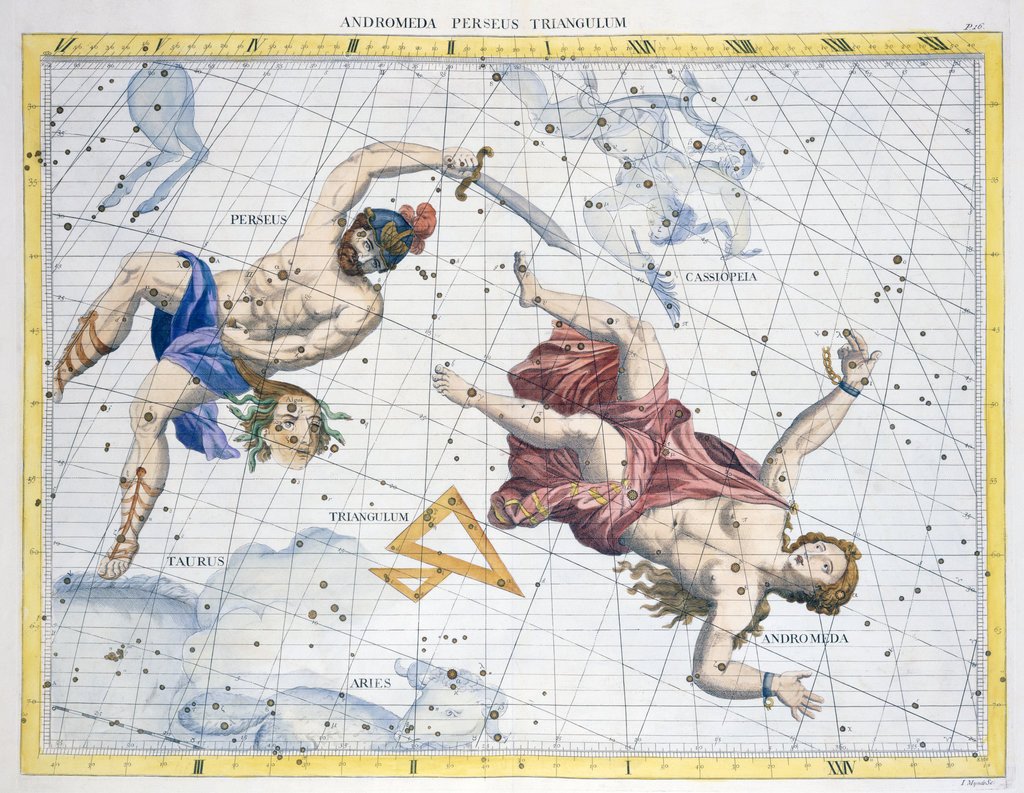
Constellations of Perseus and Andromeda, 1729. From “Atlas Coelestis”, by John Flamsteed (1646-1710), the first Astronomer Royal.
Steven Stampone
Entropy Conquers All
after Shakespeare’s Sonnet 116
So many poets have compared true love
to constant stars fixed firmly in the sky,
proclaiming, like the heavens high above,
an earthly passion that could never die.
But now we know that all things have their end,
and even stars burn only for a span;
the ruthless march of time someday shall rend
Andromeda from Perseus’s hand.
What, then, of us? How can I pledge my heart
to you alone and solemnly declare
we shall endure when all things come apart?
Love must speak truth! So on those stars I swear—
Though it may last for decades or for days,
my love for you will teach the Sun to blaze.
_______________
Steven Stampone is from Philadelphia, PA, which means that he can say “yo” without shame or irony. Though he dabbles in many genres, he’s primarily a humorist; his first published poem was a limerick. You can read more and say “yo” to him at antpoems.com.
Author’s Comments: This poem is a response to Shakespeare’s sonnet 116 (“Let me not to the marriage of true minds”), with its “ever-fixed mark” and “star to every wand’ring bark.” Shakespeare was following in a long tradition here: poets and storytellers have referred to the permanence of the stars since time immemorial. The Greek gods honored the twins Castor and Pollux by placing them side by side in the stars forever, and all the major characters in the myth of Perseus and Andromeda have their own constellation.
Neither Shakespeare nor his predecessors, however, knew what we do now about stellar lifecycles, so I felt the need to update their sentiment with a more informed outlook. There’s a little poetic license in my use of the term entropy in the title, but I’m hardly the first to stretch its meaning, and while “The Second Law of Thermodynamics Conquers All” might be more accurate, brevity is the soul of wit. Naturally, I had to respond to the Bard using his chosen form, the English sonnet.
Editor’s Notes: Entropy conquers all because chaos is inevitable in any closed system.
Here is Shakespeare’s sonnet 116 (from the Poetry Foundation) where “love conquers all”:
Let me not to the marriage of true minds
Admit impediments. Love is not love
Which alters when it alteration finds,
Or bends with the remover to remove.
O no! it is an ever-fixed mark
That looks on tempests and is never shaken;
It is the star to every wand’ring bark,
Whose worth’s unknown, although his height be taken.
Love’s not Time’s fool, though rosy lips and cheeks
Within his bending sickle’s compass come;
Love alters not with his brief hours and weeks,
But bears it out even to the edge of doom.
If this be error and upon me prov’d,
I never writ, nor no man ever lov’d.
An aside: There is no verse in the Bible that says “love conquers all.” However, there are verses and chapters in the Bible that come close in terms of meaning, including Romans 8:37, 1 Corinthians 13, 1 Peter 4:8 and Matthew 22:36-40.
The phrase “love conquers all” is derived from the following phrase in the Latin poet Virgil’s Eclogues X.69: “Omnia vincit amor et nos cedamus amori.” It means “love conquers all, let us all yield to love.” The beginning of the phrase was subsequently translated as “love conquers all” by Geoffrey Chaucer, an English poet of the Middle Ages, and thereafter passed into popular usage.
[Cited in multiple sources such as https://www.reference.com/world-view/bible-verse-says-love-conquers-59a7104f329fec90]
Image credit: Constellations of Perseus and Andromeda (magnoliabox.com)
